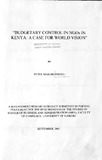| dc.description.abstract | Over the years, accountants have developed a variety of processes and techniques
designed to contribute to the planning and control functions. One of the most important
and widely used of these processes is budgeting. Budgeting involves (l) the
establishment of predetermined goals; (2) the reporting of actual performance results; and
(3) the evaluation of performance in terms of the predetermined goals.
The management accountant contributes to all three of these steps. He is usually
influential in the goal-setting stage; he is directly concerned with the reporting aspect;
and finally, interpretation and evaluation of results are considered to be an important part
of his activities.
The concept of management accounting that has been adopted in this project emphasizes
the importance of organizational planning and control. Managerial accountant play an
important role in influencing behavior at all the various stages of management process
including: (a) the setting of goals; (b) informing individual what they must do to
contribute to the accomplishment of these goals; (c) motivating desirable performance;
(d) evaluating performance; and, (e) suggesting when corrective action must be taken.
While existing budgetary theory can not provide a set of specific rules, which will work
in every budgeting situation, it does furnish a conceptual basis for evaluating the
effectiveness of various budgeting practices in contributing to the achievement of
organizational objectives. This project addresses itself to the process with specific
reference to the Kenyan NGOs with specific reference to World Vision(K) which runs
both develomental and relief programs. The focal point throughout the study is the Area
Development Manager (ADP Manager), defined as the person who heads a project.
This study establishes how accurately budgets anticipate the level and direction of actual
results. It also addresses the question of whether actual results are the consequence of the
canceling out of large individual organizational errors or whether the predictive accuracy
cluster closely around some mean error.
The analysis found out that budgetary practices in relief organization are clearly different
from developmental organizations due the differences in donor funding and reporting
requirements. It established that more stringent controls exist in relief programs than in
developmental ones. It is established that more complex control techniques are required
in developmental programs than in relief, programs due to close donor supervision and
need for monthly accountability in the later as opposed to the former whose funding is
not followed with strict reporting requirements. Several other factors were found to
influence the lack of effective control in developmental organizations. | en |

